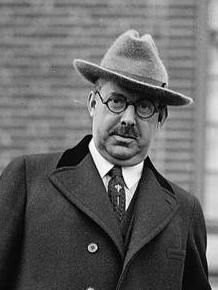Presidency of Warren G. Harding
The presidency of Warren G. Harding began on March 4, 1921, when Warren G. Harding was inaugurated as the 29th president of the United States, and ended with his death on August 2, 1923. Harding, a member of the Republican Party, was succeeded by his vice president, Calvin Coolidge.
Domestic Policies[edit | edit source]
Harding's administration is often remembered for its pro-business stance and efforts to reduce the national debt. He advocated for a "return to normalcy" following the upheaval of World War I. His domestic policies included tax cuts, particularly for the wealthy, and efforts to reduce government regulation of business.
Economic Policies[edit | edit source]
Harding's economic policies were characterized by a focus on reducing the national debt and lowering taxes. The Revenue Act of 1921 was one of the key pieces of legislation during his presidency, which reduced taxes on high incomes and corporate profits. Harding also supported the establishment of the Bureau of the Budget to streamline government expenditures.
Labor and Social Issues[edit | edit source]
Harding's administration faced significant labor unrest, including strikes in the coal and railroad industries. He signed the Sheppard-Towner Maternity and Infancy Act, which provided federal funding for maternity and child care, marking a significant step in social welfare policy.
Foreign Policies[edit | edit source]
Harding's foreign policy was marked by a desire to return to isolationism and avoid entanglements in foreign alliances. He supported the Washington Naval Conference, which aimed to prevent an arms race by limiting naval construction among the major powers.
[edit | edit source]
The Washington Naval Conference of 1921-1922 was a significant achievement of Harding's presidency. The conference resulted in several treaties that limited naval armaments and aimed to prevent future conflicts. The Five-Power Treaty, Four-Power Treaty, and Nine-Power Treaty were all outcomes of this conference.
Scandals and Controversies[edit | edit source]
Harding's presidency was marred by several scandals, the most infamous being the Teapot Dome scandal. This involved the secret leasing of federal oil reserves by the Secretary of the Interior, Albert B. Fall, who was later convicted of accepting bribes.
Teapot Dome Scandal[edit | edit source]
The Teapot Dome scandal was a major political scandal that took place during Harding's presidency. It involved the secret leasing of federal oil reserves at Teapot Dome, Wyoming, and other locations to private companies in exchange for bribes. The scandal significantly tarnished Harding's reputation and led to greater scrutiny of government corruption.
Death and Legacy[edit | edit source]
Harding died suddenly of a heart attack on August 2, 1923, while on a speaking tour in San Francisco, California. His death brought an abrupt end to his presidency, and he was succeeded by Vice President Calvin Coolidge. Harding's legacy is often viewed through the lens of the scandals that plagued his administration, though some historians also note his efforts to promote economic growth and stability.
Related Pages[edit | edit source]
- Warren G. Harding
- Calvin Coolidge
- Teapot Dome scandal
- Washington Naval Conference
- Revenue Act of 1921
- Sheppard-Towner Maternity and Infancy Act
0
Search WikiMD
Ad.Tired of being Overweight? Try W8MD's physician weight loss program.
Semaglutide (Ozempic / Wegovy and Tirzepatide (Mounjaro / Zepbound) available.
Advertise on WikiMD
|
WikiMD's Wellness Encyclopedia |
| Let Food Be Thy Medicine Medicine Thy Food - Hippocrates |
Translate this page: - East Asian
中文,
日本,
한국어,
South Asian
हिन्दी,
தமிழ்,
తెలుగు,
Urdu,
ಕನ್ನಡ,
Southeast Asian
Indonesian,
Vietnamese,
Thai,
မြန်မာဘာသာ,
বাংলা
European
español,
Deutsch,
français,
Greek,
português do Brasil,
polski,
română,
русский,
Nederlands,
norsk,
svenska,
suomi,
Italian
Middle Eastern & African
عربى,
Turkish,
Persian,
Hebrew,
Afrikaans,
isiZulu,
Kiswahili,
Other
Bulgarian,
Hungarian,
Czech,
Swedish,
മലയാളം,
मराठी,
ਪੰਜਾਬੀ,
ગુજરાતી,
Portuguese,
Ukrainian
Medical Disclaimer: WikiMD is not a substitute for professional medical advice. The information on WikiMD is provided as an information resource only, may be incorrect, outdated or misleading, and is not to be used or relied on for any diagnostic or treatment purposes. Please consult your health care provider before making any healthcare decisions or for guidance about a specific medical condition. WikiMD expressly disclaims responsibility, and shall have no liability, for any damages, loss, injury, or liability whatsoever suffered as a result of your reliance on the information contained in this site. By visiting this site you agree to the foregoing terms and conditions, which may from time to time be changed or supplemented by WikiMD. If you do not agree to the foregoing terms and conditions, you should not enter or use this site. See full disclaimer.
Credits:Most images are courtesy of Wikimedia commons, and templates, categories Wikipedia, licensed under CC BY SA or similar.
Contributors: Prab R. Tumpati, MD







